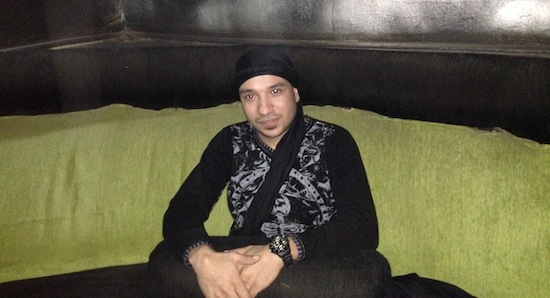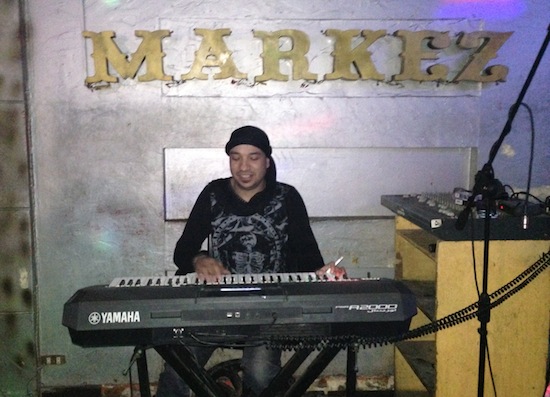Click here to read the rest of the Electro Chaabi In Cairo series
We meet Hicham Chadly in the car park of the Marriott – but not before getting lost in the giant hotel for about 40 minutes. You could come to Cairo and never leave its massive and perfectly manicured gardens. And it seems that is exactly what many Western visitors sipping wine and beer under parasols are doing. One guest looks uncannily like Timothy Spall’s character Eric Lyle from the film adaptation of Paul Bowles’ gap year travel essential, The Sheltering Sky. Lyle is a linen suited colonial soak lost both geographically and spiritually, and is a character alongside John Malkovich and Debra Winger’s hateful proto-beatnik couple in what is probably the most unlovable film ever made. This jarring and unwanted reminder of feckless jet trash upper and lower class, past and present, practically makes me start jogging in a panic round the hotel looking for a way out. Eventually, we trace our way to freedom by listening out for the sound of car horns getting louder and louder.
Safely ensconced in Hicham’s car we start driving for the nightclub Markez. It’s only unusual to find yourself discussing the finer points of Skullflower’s back catalogue with an Egyptian man if you presume too much about the country. For him the band are an obsession yet he is very kind about my dilettantish attempts to speak to him about it: "Yes, Fucked On A Pile Of Corpses is a good album but they were best in the late 80s and early 90s when Stefan Jaworzyn and Matthew Bower were working together. Xaman and Form Destroyer are the records you need."
He continues: "There is a bit of a noise scene here, mainly involving guys who make experimental music on laptops. But Chipsy is doing something different to that. He is making some really wild music."
After going to the wedding of Sadat and Samer the previous night, I’ve come to realise that the clips I’ve seen of Chipsy – the reason why Joost and I came here – are of a different style of music. I ask him if I’ve got it wrong by saying that Chipsy is electro chaabi. He says: "Yes and no. It’s all new chaabi but personally I would call the whole thing something like new wave chaabi. Chipsy doesn’t make the same kind of music as any of the guys you saw last night, though. What he does is different… it’s a different branch. Chipsy is more like a bridge between the old and the new. He is taking the old music and pushing it forward.
"It’s best to not ask Chipsy about electro music. He doesn’t have any kind words to say about those guys because he is a real musician. He comes from a more musical tradition which he is proud of. With those other guys, it’s more of a fad."
However, personally Hicham recognises that they are all pushing Chaabi forward into new territory, and he takes care in particular to praise Sadat’s improvised rhyming skills ("he’s on a totally different level to all the other MCs – he has something special") and 7a7a’s synth production work, which is very innovative and not really a key part of the scene.
He continues: "Chipsy is more influenced by Egyptian pop music than those guys. I used to call what he does Nile Delta Synth. This name perhaps sums up what he does better."
Hicham is putting out a compilation of live tracks by the young keyboard wizard and if everything goes according to plan it’ll be out on Nashazphone and distributed in the UK by Cargo – something that we at the Quietus are very excited to hear.
An old clip of Chipsy performing ‘his style’ live
I tell him that I think it’s weird that his first commercially available release will be a live compilation – Chipsy visits the studio daily in an almost monastic devotion to playing and recording music. Hicham grins: "Well, Chipsy is a very proud musician and when you get him in the studio he will try and make his recording as perfect and as clean as possible. But when you see him play live, when he’s battling with this old equipment, trying to turn it up as loud as possible, it is distorted, raw and dirty-sounding. And that’s what I love. I told him, ‘Brother you have to trust me on this.’ And we are like brothers and he does trust me, but for Egyptian musicians, it’s hard for them to understand why we’d want it like this."
I say that the situation reminds me of Konono No. 1 who ended up with a very distinctive sound after having to use old Tannoy speakers to amplify their music, ending up with the very metallic distortion this causes.
He agrees: "Yeah, I know Konono No. 1 and I know what you mean. The accidental sound can be what Westerners initially hear in it and fixate on, because it reminds them of something they are already familiar with."
We’re driving to meet Chipsy in the Markez nightclub. It might well be 5pm, but for him it’s just after breakfast time. He keeps what Hitcham calls vampiric hours, after setting up here he practices, eats, starts playing at 7pm. A relaxed set of two hours before the club fills up. Then he really earns his money in the rammed venue up until midnight. Then it’s either on to a wedding or private party ’til four. The next two hours are spent working on studio techniques and recordings – the studio he is attached to has risen to be regarded as the second best place for recording Chaabi. No one says anything, but you certainly get the sense that they have their eyes set on pole position. This still leaves enough time for two hours practice before bed at 8am.
During our interview a phone starts ringing, and Chipsy starts unloading iPhones and mobiles out of his pockets onto the table. Hicham jokes: he has one for every style of music he plays.
Hicham, whose day job is working in construction, translates our conversation, cajoling answers out of his charge, until I ask how well-known he is in Cairo. He sighs and says, "I’m going to answer this for him because he’s too modest. He is an extremely gifted musician doing important work. At first when people heard him doing his own style, they thought that it was a gimmick or stunt and nice enough, but then after he kept on doing it they started to realise that he was doing something completely new. He was an innovator. And for the young people… He is the best. He is the keyboard king of Cairo."
Hicham explains what he has said to Chipsy, who squirms uncomfortably and starts fiddling with his collection of phones.

Walking round Cairo waiting for the club to open, we come across a huge makeshift tent that has been erected out of scaffolding and giant decorative rugs. At either end, huge Tannoy speakers broadcast a sole male voice in Arabic. I would say it is music, but it sounds very much like a more complex form of the call to prayer. When we go over to ask one of the many smartly dressed men what the sound is, he tells us that it is readings from the Koran, so although it sounds musical, in fact it isn’t.
A very important professor and doctor in the field of blood disorders has died and her husband’s colleagues are paying tribute. She was regarded as very important and popular, and the service was too big to be held in the mosque over the road.
"Come and pay your respects. Welcome, welcome. Then have a drink of tea or coffee. These services are not just for friends but for strangers as well", says the man we speak to.
We pass along with a line of mourners shaking hands and then are treated to a cup of sweet Turkish coffee. We stand and talk to several people who seem very well acquainted with life in the Netherlands and London.
Chipsy warms up for a night at Markez
Later in the club Joost and I are greeted by raucous shrieks and whoops of delight mixed with hilarity from a table of women by the door. This is the first time this has ever happened to me, and one would reasonably and rationally presume it will be the last time as well.
The ladies are hostesses, and they glide from table to table making jokes with the men in there drinking and watching music, encouraging them to clap along in time. There are perhaps three times as many men who seem to be fulfilling a similar role, but without the rhythmical swaying.
Chipsy gives us a cheery wave with one hand from the stage as he continues playing bass keyboard notes with his other hand. Two elderly men in traditional Egyptian dress – the first I’ve consciously registered as such during this trip – are eating fruit out of swan-shaped, ornamental dishes formed from tin foil. They are smoking up a storm on water pipes. Every other song they are handed large handfuls of fake money to throw over the singer. After the song ends, one of many club employees gathers it all up again ready for the next ritualised display of largesse.
Chipsy’s singer – no one seems to know what I’m talking about when I ask her name, they just say Chipsy! Chipsy! – pours her heart out, she looks anguished, I can tell she has suffered some great emotional wrong in her life. And then I realise she has me… this is her mawal – the point of this kind of Shaabi is to relate a great sense of emotion.

Chipsy is the bridge between the old musical Egypt and the new. The old songs are about longing, what could have been, the yearning brought about by a strictly codified society. The big difference in the new songs of the electro chaabi crew is not is not that they’re eight-bit and use Fruity Loops and Autotune, but the fact that they assert themselves lyrically. The song ‘The People Want Five Pounds Phone Credit’ is a lot more revolutionary when seen in this context.
(Well, it’s revolutionary in any context, check out what the blogger Ted Swedenburg has to say about the song on his awesome Hawgblawg:
"If the artists who performed at Tahrir in early 2011, and who continue to play there in ongoing protests since the uprising, mostly manifest veneration of the country’s national revolutionary repertoire, the usual attitude of mahragan artists to that tradition is one of irreverence, humor and even sarcasm. This sensibility is on full display in the mahragan song ‘The People Want Five Pounds’ Phone Credit’ (Al-Sha‘b Yurid Khamsa Ginay Rasid) by DJ ‘Amr Haha (or 7a7a), from ‘Ayn Shams, and DJ Figo, from al-Salam City. The song opens to the slow strains of Egypt’s national anthem, ‘Biladi, Biladi’, penned by Sayyid Darwish, played on an electronic keyboard. The anthem quickly begins to grind down and then is abruptly halted with an electronic crash, as the beats of sha‘bi darbouka take over, and a vocalist (probably Figo) chants,
The people want something new [to think about]
The people want five pounds’ phone credit
The people want to topple the regime
But the people are so damn tired.
‘The People Want Five Pounds’ Phone Credit’ both invokes the famous slogan of the Arab revolts, and at the same time, the people’s (and especially the people of the sha’bi quarters) exhaustion with it.")
Essentially, these words speak for themselves, what good is a revolution that leaves the common man even worse off than before? The young people are tired of revolutionary rhetoric, they simply want what other people around the world take for granted. In fact, as Soraya Morayef points out, some mic men cut to the chase when they simply get the crowd to chant: "yasqut yasqut hokm al-‘askar" or "down, down with military rule." You can have as many revolutions as you like in Egypt, they won’t achieve anything if they leave the military command structure exactly the same as it was before.
I have no idea what the lady tonight is singing, but it is beautiful whatever the context or meaning.
It is a distraction that there are so many people working here though. There are so many more of them than customers. One of the many sharply dressed men in black suits try and position us on a table closer to the stage because there is going to be a dancer.
We turn him down despite his entreaty to us to move forward. An extremely shapely and tall Egyptian lady in traditional costume performs a belly dance which puts any others I’ve seen (admittedly, nearly all of which have been performed by white people with dreadlocks who smell vaguely of hashish) to shame. A matronly lady stands by my table encouraging us to clap, another sharp-suited man stands by our table seemingly only having the job of folding paper serviettes to go under our glasses and ashtray, while yet another man is on hand just to pour water. I’m starting to panic slightly – how much is all this going to cost – we’re in the middle of nowhere in a Middle Eastern nightclub, I’ve got no frame of reference. I’m really enjoying the music but after a few coffees I tell Joost that I’d like to be going as I’m really worried about the bill.
There are many entreaties for us to stay and to enjoy the rest of the night but we insist it is time for us to keep another appointment. The matronly lady says: "Do not worry about the drinks, they are on the house."
Everyone lines up by the door and we shake a lot of hands on the way out. Chipsy waves us out as he carries on playing.
Outside in the Cairene night I say to Joost: "I think I just treated that place as if it were a Soho strip club and I was the mark running up a colossal tab. But they just wanted us to have a good time as their guests. There were a lot of staff there because it’s early and the club is mainly empty. I feel awful. I judged them by our standards and disrespected their hospitality."
And a flood of sadness that I can barely express fills my heart.
For excellent photographs from Sadat and Samer’s wedding visit Ester Meerman’s Stories From Cairo blog. One of her YouTube clips of the night is below.






